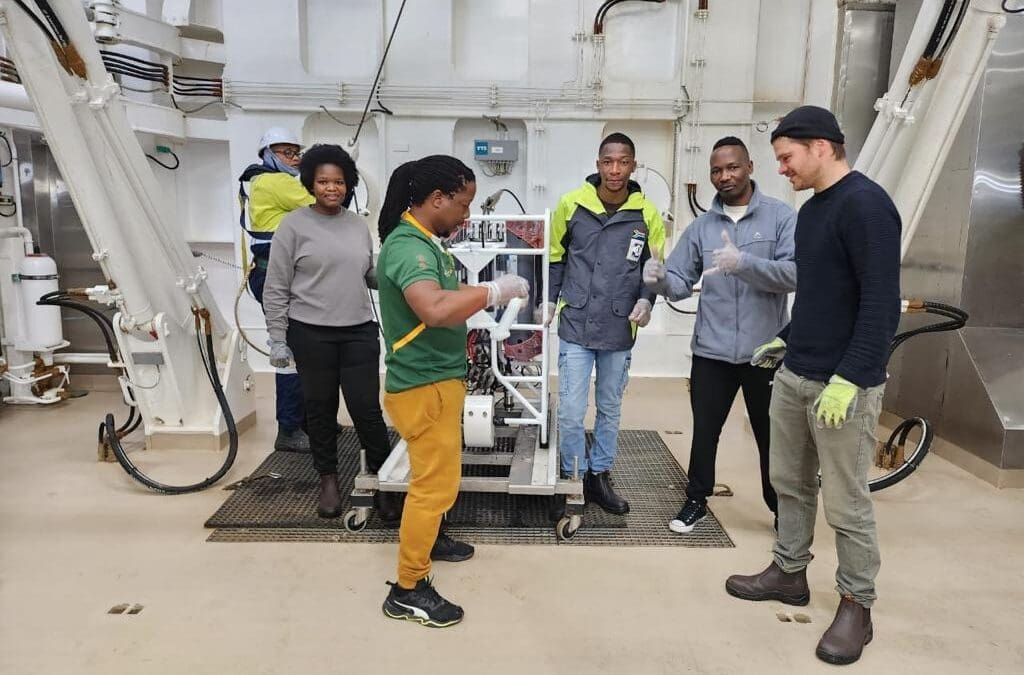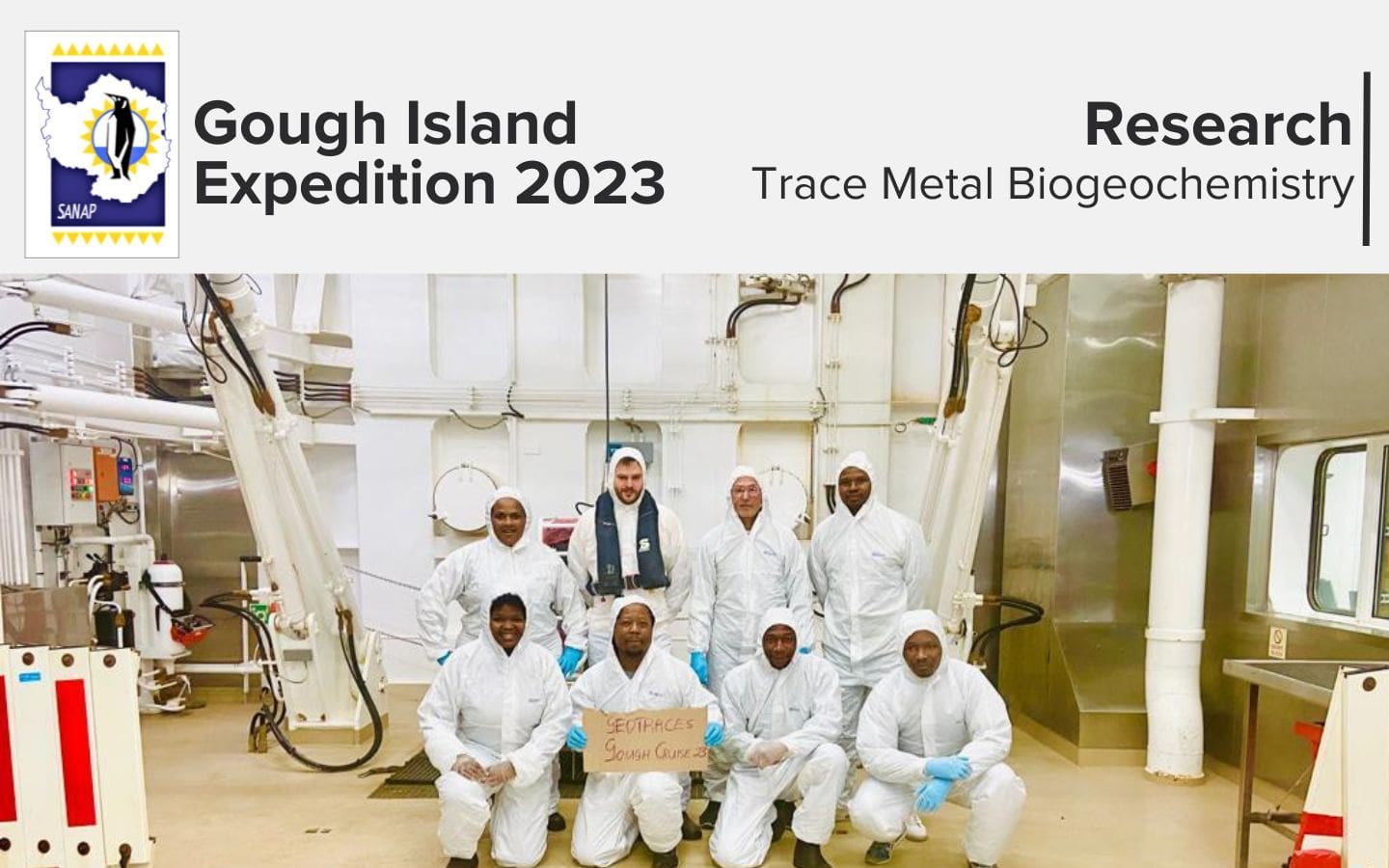Research team on the recent Gough Island takeover expedition.
Phytoplankton are microscopic plants that live in the ocean, and just like plants on land they need to have enough food to grow and be happy. However, some places in the ocean don’t have enough food for them whereas some places do. The Southern Ocean Carbon & Climate Observatory (SOCCO) team based at CSIR, Trace Metals team based at Stellenbosch University (TracEx) and the Department of Forestry, Fisheries and the Environment: Oceans and Coasts team are trying to figure out where those places are (in the Southern Ocean).
During the Gough Island takeover expedition:
The Trace Metal Biogeochemistry research teams sampled upstream and downstream of Gough Island to look at how the Antarctic Circumpolar Current (ACC) interacts with the island to resuspend sediments from the seafloor. This resuspended sediments acts as a source of trace metals to the surface mixed layer in support of phytoplankton blooms. The team used a 12 bottle mini-CTD rosette system (see image below, right) to sample for dissolved trace metals, particulate trace metals and organic trace metal chemistry.
| TEAM | Trace Metal Biogeochemistry | |
|---|---|---|
| Projects Name | Seasonal Iron speciation in the Southern Ocean, from open ocean environments to naturally fertilized sub-Antarctic Islands (Marion and Gough Island) | |
| Principal Investigator | Dr Thomas Ryan-Keogh | Senior Researcher at the Southern Ocean Carbon-Climate Observatory (SOCCO), CSIR South Africa |
| Co-Principal Investigator (On board DFFE team leader) | Dr TN Mtshali | Department of Forestry, Fisheries and the Environment (DFFE) |
| Co-Principal Investigator | Prof AN Roychoudhury | Stellenbosch University (TracEx) |
| SOCCO/TracEx on board team leader | Olie Valk | TracEx |
| On board team member (PhD Student) | Thapelo Ramalepe | SOCCO-TracEx |
| On board team member (MSc Student) | Miranda Sitofile | SOCCO-TracEx |
| On board DFFE team member | Mutshutshu Tsanwani | DFFE |
| On board DFFE team member | Kanyisile Vena | DFFE |
| On board DFFE team member | Hassan Ismael | DFFE |
| On board DFFE team member | Mbulelo Makhetha | DFFE |
| On board team members | Including all ship-based scientists sampling for trace metals | |
The project in more detail:
The Southern Ocean (SO) is one of the largest high-nutrient low-chlorophyll regions in the World’s Ocean, where primary productivity is limited by iron bioavailability, thereby impacting the strength and efficiency of biological carbon pump. There are, however, exceptions with large phytoplankton blooms persistently observed downstream of the sub-Antarctic Islands. While extensive research has focussed on iron-biogeochemistry around Kerguelen and Crozet islands, no such studies have been conducted at Marion and Gough islands.
Furthermore, whilst our previous studies have made substantial advances toward addressing the gaps in seasonal data coverage through the Southern oCean seAsonaL Experiment (SCALE) 2019 winter and spring expeditions, there is still a paucity of dissolved iron data in the SO, especially from autumn to late spring. This is severely hampering our understanding of the full seasonal biogeochemical iron cycle and its impact on primary production. This project aims to continue its focus on seasonality by expanding seasonal coverage of iron measurements to include autumn (Marion) and late-spring (Gough) expeditions for more comprehensive coverage of the SO seasonal cycle, with a particular focus on quantifying biogeochemical cycling of iron-pool around these understudied islands.
This project is funded by: The National Research Foundation, South African National Antarctic Programme funding (NRF-SANAP).
Current NRF-SANAP funded projects
Visit SOCCO here! Visit TracEx here!
Featured Image: L-R (Back): Kanyisile Vena (DFFE), Ole Valk (TracEx), Hassan Ismael (DFFE), Mbulelo Makhetha (DFFE); (front) Miranda Sitofile (SOCCO-TracEx), Thato Mtshali (DFFE), Thapelo Ramalepe (SOCCO- TracEx), Mutshutshu Tsanwani (DFFE).
Project information supplied by Dr Thomas Ryan-Keogh. Images supplied by Thapelo Ramalepe.
Anche Louw, South African Polar Research Infrastructure, 30 October 2023.








